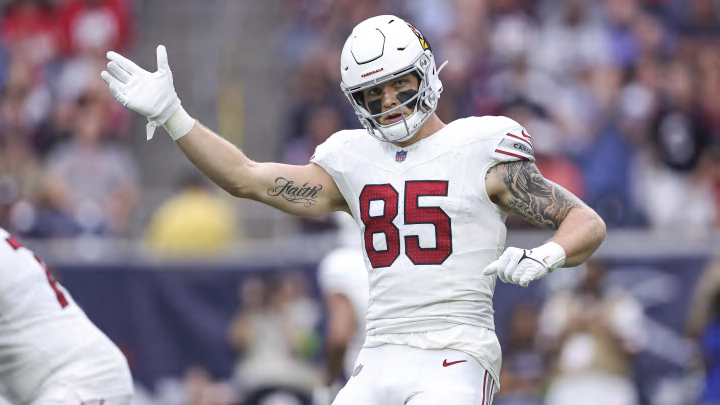Fantasy Football Rankings: Trey McBride vs. Mark Andrews

Subscribe to Fantasy Dirt: Apple | Spotify | YouTube
Making the right choice can be the difference between winning and losing, both in the National Football League and fantasy football. Case in point ... In the 1990 NFL Draft, nine tight ends were drafted in the first six rounds. That included Eric Green (Steelers), Mike Jones (Vikings), Walter Wilson (Chargers), Jesse Anderson (Buccaneers), Jackie Harris (Packers), Charles Arbuckle (Saints), Derrick Walker (Chargers), Ronnie Haliburton (Broncos) and Scott Galbraith (Browns).
All of them went ahead of … Shannon Sharpe.
Sharpe, who was the 192nd pick in the seventh round, finished his career with 815 catches, 10,060 yards and 62 touchdowns. Sharpe, who had just 1,638 fewer yards than those other eight tight ends combined, was inducted into the Pro Football Hall of Fame in 2011.
All of those teams (aside from the Broncos, who ultimately picked Sharpe), chose poorly.
The same sort of thing happens in fantasy football. If you make the wise choice, it can lead you to a championship. Make the wrong one, and you can be left in the dust.
With that said, it’s time to bring back our “Making the Call” series here at Sports Illustrated. In the series, Jen Piacenti and I will be looking at two players from the same position who have a near-identical average draft position (ADP) and tell you who you should pick.
Since we’re talking tight ends, let’s compare two superstars in Trey McBride and Mark Andrews. At the National Fantasy Football Championships, they’re coming off the board within five picks of one another. McBride is going at 49.6 overall over the last two weeks of drafts, while Andrews is being picked on average at 54.3 overall.
So, who’s the right call? Let’s break it down.
Offenses
In Arizona, the Cardinals ranked 23rd in pass percentage (55.9%) last year under offensive coordinator Drew Petzing. In the nine games Kyler Murray started, the team ranked 15th in pass attempts. More interestingly, no team’s quarterback threw the ball more often to their tight ends from Weeks 10-18. In that time, 34% of Murray’s throws went to the position.
The Ravens offense will once again be led by coordinator Todd Monken. His team threw the football 49.7% of the time last season, which ranked last in the NFL, and his field generals threw the ball 29.1 times per game. The Ravens were also ninth in their percentage of targets that went to tight ends for the entirety of the season. In Weeks 2-11, when Andrews was active, the Ravens ranked seventh in terms of the most targets to their tight ends.
Winner: Push
Receiving Skills
Andrews has a much longer resume than McBride, making him the safer and more experienced player. However, we can still take a look at their respective stats from this past season.
McBride wasn’t used much in his first five games, seeing a combined 10 targets. When Zach Ertz went down, however, McBride’s totals went bananas. Starting in Week 6, McBride was third in targets, second in catches, and second in yards after first contact among tight ends. He was also fifth in both big plays and red-zone targets
As for Andrews, he played in just 10 games last season. During that time, he averaged 6.1 targets and 4.5 catches. He was eighth in yards after contact, third in big plays, and first in red-zone targets among tight ends. Lamar Jackson also targeted his tight ends on 24.6% of his throws in that time among quarterbacks who started at least eight games.
In his last full season (2022), Andrews ranked third in targets, tied for third in catches, third in yards, 14th in yards after first contact and fourth in red zone targets at tight end.
Winner: Push
Quarterbacks
As I mentioned earlier, Murray targeted his tight ends 34% of the time in Weeks 10-18, during which time McBride was Arizona’s top tight end. I think we also need to keep in mind that in five of those games, former Cardinals No. 1 wide receiver Marquise Brown was either out or barely played.
On the flip side, Lamar Jackson has a long-standing relationship with his favorite target Andrews. In fact, 27% of his career pass attempts have gone to him.
Winner: Andrews
Durability
McBride has a small sample size in the NFL, playing in 33 games. He did miss nearly two weeks of practice last preseason due to an injured back which also cost him Week 1. He would play in the remaining 16 games, however. Our friends at Sports Injury Predictor still give him a high durability rating (5.0), with a 3.7% chance of suffering an injury per game.
Andrews has a much longer resume, of course, and he’s had his share of injuries. This past season, he missed seven games with a cracked fibula. He had been mostly durable up to that point though, playing in at least 14 games in each of his previous five years. Sports Injury Predictor gives Andrews a 5.4% chance of injury per game for this season.
Winner: McBride
Strength of Schedule
Based on the RotoWire Strength of Schedule model, Andrews has the advantage when it comes to the upcoming slate. Ravens tight ends have the eighth-easiest schedule based on last season’s defensive totals, while Cardinals tight ends have the 14th-toughest slate.
Winner: Andrews
Vegas Odds
Andrews is currently at +40000 to win the NFL’s MVP, while Chase isn’t even listed on DraftKings. In terms of the Offensive Player of the Year honors, Andrews comes in at +15000, while McBride comes in at +25000.
Andrews has a slight edge in the most receiving yards (+7000) over McBride (+8000), not to mention the most touchdown catches. In that category, Andrews comes in at +4000 compared to McBride, who is at +8000.
Winner: Andrews
And the Pick Is…
Drafting either McBride or Andrews is a win in fantasy drafts. In fact, McBride is easily one of my favorite breakout candidates in fantasy football. Heck, I can see him being one of the three best tight ends based on points at season’s end.
The concerns about McBride surround the high target share he had late last year and whether he can continue to see so many chances after the Cardinals' offseason moves. The team drafted an alpha wideout in rookie Marvin Harrison Jr. and signed veteran Zay Jones, both of whom will absorb targets. Second-year receiver Michael Wilson also could push for a bigger role in the passing game, shrinking McBride’s potential share.
By comparison, Andrews has long been one of the top tight ends in fantasy football. He’s put up an averaged of at least 12.2 PPR points in five straight years, including three where he’s averaged 13.5 points per game. He’s also the unquestioned top target in the Ravens average pass attack, and targets could be even more plentiful with Odell Beckham Jr. off the roster.
This is a very close call to be sure, and some might push for McBride just based on what is perceived to be a higher ceiling. But Andrews, who turns just 29 in September, has a long resume of success and is a virtual lock to see 80-plus targets from Jackson in 2024.
Winner: Andrews
